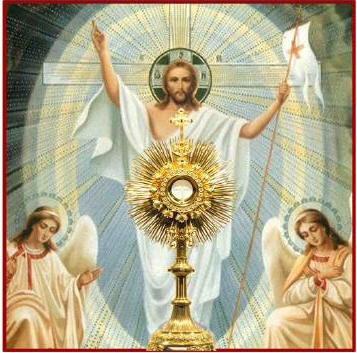Wednesday Jun 02, 2021
June 6 - The Solemnity of the Most Holy Body and Blood of Christ, Cycle B

First Reading Exodus 24:3-8
The covenant is established between God and the people.
Responsorial Psalm Psalm 116:12-13,15-16,17-18
God brings salvation.
Second Reading Hebrews 9:11-15
Christ is the mediator of the new covenant.
Gospel Reading Mark 14:12-16,22-26
Jesus shares his Last Supper with his disciples.
Background on the Gospel Reading
Today, the second Sunday after Pentecost, we celebrate a second solemnity, which marks our return to Ordinary Time in the liturgical calendar. Today is the Solemnity of the Most Holy Body and Blood of Christ. At one time, this day was called Corpus Christi, the Latin words for “the Body of Christ.” In the most recent revision of our liturgical rites, the name for this day is expanded to be a more complete reflection of our Eucharistic theology.
In our reading for today, we read the account of the Last Supper found in the Gospel of Mark. It begins with the instructions that Jesus gave to his disciples to prepare their Passover celebration. It then goes on to give an account of the Last Supper. On this Sunday, however, our Lectionary reading omits the verses between these two passages; in those omitted verses we hear Jesus predict his betrayal by one of his disciples.
The Gospel of Mark describes Jesus’ Last Supper with his disciples as a celebration of the Jewish feast of Passover. The Jewish celebration of Passover is a memorial to and a ritual participation in the defining moment of Israel’s history. It celebrates God’s deliverance of his people from slavery in Egypt. The Passover meal includes many ritually important elements, such as unleavened bread, lamb, and bitter herbs. Each food item recalls an aspect of the Exodus event. The instructions for the preparation of this meal are carefully prescribed in the Law of Moses. It is a central obligation of the Jewish faith tradition to celebrate this meal and to give thanks to God for his deliverance and protection.
In the description of the Passover meal found in today’s Gospel, however, Mark omits many elements of the Jewish Passover meal. Instead he describes only those elements he believes to be most essential to the Christian Eucharist: Jesus took bread, blessed the bread, broke the bread, and shared it with his disciples. Similar words and actions follow as Jesus shares the chalice with his disciples. This bread now shared is Jesus’ own body. Those who drink from the chalice are invited to share in a new covenant which will be sealed by Jesus’ own blood. Mark’s Eucharistic theology looks forward to the Kingdom of God that Jesus inaugurates.
The Gospel for today reminds us that the Eucharist is a memorial of Christ’s sacrifice on the cross. We believe that Jesus is truly present to us in the elements of bread and wine. Each time we celebrate this sacrament, we prepare for the Kingdom of God. This celebration, as the Second Vatican Council taught us, is the source and summit of the Christian life.
Comments (0)
To leave or reply to comments, please download free Podbean or
No Comments
To leave or reply to comments,
please download free Podbean App.